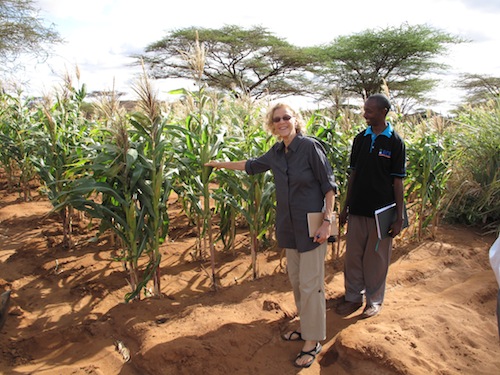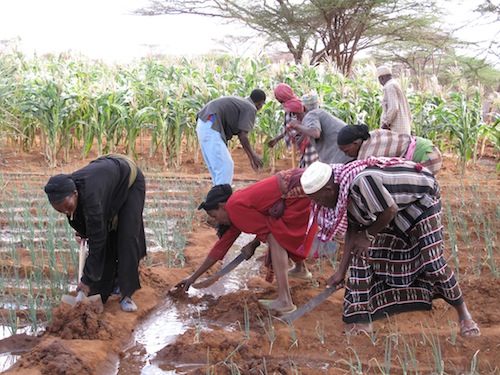
As my plane began its descent into the Jomo Kenyatta International in Nairobi, Kenya last week, my attention vied between the urban city I saw through my porthole and the photograph lying on my lap: the image of a vast arid land, littered with the carcasses of livestock that couldn't survive the drought-like conditions affecting the greater Horn of Africa.
The humanitarian organization I represent, Action Against Hunger | ACF International, has worked for years helping vulnerable communities in Kenya, but the current crisis has required our teams to redouble their efforts.
Across Kenya, some 3.75 million people have been affected by the regional drought and food crisis. In fact, it's now estimated that between 50,000 to 65,000 children under five suffer from severe acute malnutrition -- a deadly condition if left untreated -- while another 320,000 suffer moderate acute malnutrition. Add to this some 90,000 undernourished pregnant or nursing women and you get a sense of how badly families have been affected in many of Kenya's hardest-hit districts. Garbatulla is one of those districts.
Garbatulla, a town of about 45,000 people, was once fed by five rivers and enjoyed relative prosperity. As pastoralists, the people of Garbatulla had long earned their livelihoods buying, raising and selling livestock, but all of this changed over the past three years as Garbatulla's inhabitants looked to the sky for rains that never came and watched four of their five rivers dry up completely. Without water, their animals had no fodder, 40 to 60 percent of the livestock died and lifelong inhabitants had no means of supporting themselves or their community.
Transitioning from Pastoralism to Farming
Action Against Hunger saw a way out for the people of Garbatulla, but it would require a significant socioeconomic shift. While recent climatic shocks have made it difficult to raise livestock, water for crop irrigation exists beneath the earth's surface, so our teams set out to create a series of pilot farming projects to help these communities learn farming techniques.
Emergency assistance costs seven times more than preventative measures like investments in infrastructure and agriculture; in fact, it's estimated that for every dollar invested in a community's productive assets, a $9 return is earned, according to the Consultative Group on International Agricultural Research (CGIAR).
It's an understanding that has long informed ACF's mission. This trip -- one of many I take every year to track the progress of our programs -- was less a first-hand tour of our emergency interventions than an inside look on the ways in which our work supports longer-term development programs that could change the future for Garbatulla and perhaps, the other drought-stricken communities of the Horn.
The first stop on my tour of Garbatulla was to an agricultural support program where ACF had installed a 1,300 gallon irrigation tank connected to a borehole we rehabilitated. From the tank, workers guided the flow of water into small canals along newly planted fields, and laid row-upon-row of punctured piping over seedlings to create a functional drip irrigation system. Each worker was paid daily through our cash-for-work program, which allows families to receive emergency infusions of cash while helping to build productive resources for their community.
Helping the Most Vulnerable Generate Income
Beyond these farming projects, Action Against Hunger has set up cash-transfer programs to help the most disadvantaged residents generate income. I visited one elderly woman enrolled in this program who had received a $120 cash grant based on the business plan our teams helped her develop. This woman has set up a small outpost selling spices, oils and other cooking accoutrements in anticipation of the new crops being grown in the region.
ACF's cash-transfer programs target the most vulnerable -- often people with dependents who have lost productive assets, have few job prospects and receive no external support -- and provide them with business development and financial management support. And these programs work wonders: with very modest outlays, the woman I visited was able to set up a business and get back on the road to self-sufficiency.
Ensuring Lifesaving Access to Clean Water
On one of my final days in Garbatulla, I visited the small village of Duse, a town whose only remaining water had come from a natural spring miles away piped into water taps and an aboveground "earth pan" -- a natural reservoir we manipulate to collect and conserve rainwater. The piped water had ceased to work and the earth pan was down to its last dregs. The 6,000 people of Duse were absolutely without water when we arrived.
As I watched women gather around earth pan with their empty jerrycans only to find dirty, silt-laden water unfit for cooking, washing or drinking, I knew we had to find an immediate solution.
Our water and sanitation team quickly began investigating the cause of the stoppage: the network of pipes that pumped water into Duse was in tatters, and digging up the piping and replacing it would take weeks or even months. Thanks to donations from our Horn of Africa initiative, we knew we could undertake the expense of trucking clean water into Duse while we worked on a plan to repair the infrastructure. I left knowing that fresh water would soon arrive for the 6,000 inhabitants of Duse.
Just like the paved highways that don't reach Garbatulla, the region's share of vital services also fall short. To date, Action Against Hunger remains the only NGO working in Garbatulla, providing a range of life-supporting services. The elders of Garbatulla I spoke with said they were embarrassed to have to ask for help, but they know they need it, and they fear ACF will leave them for other areas in need. And while I personally had to bid farewell, I knew that, Action Against Hunger's teams would remain to carry out the community-based solutions that will help them weather this crisis and those to come.
As I left Kenya a day later, I once again had Nairobi visible through my porthole on one side, but this time, I held a photograph of a corn-stalk taller than me on my other.

